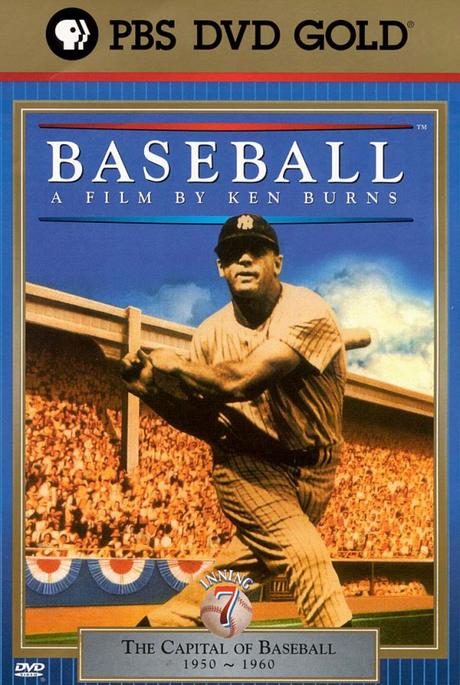
The Seventh Inning of Baseball: A Film by Ken Burns takes us into the 1950s in America. Subtitled “The Capital of Baseball,” this installment of the documentary revolves primarily around New York City and the three teams who dominated the baseball world during this decade: the New York Yankees, the New York Giants, and the Brooklyn Dodgers. For ten straight years (1947-1956) a local team always played in the World Series, and a local team won nearly all of them as well.
It was certainly a great decade for the Yankees under manager Casey Stengel. With Mickey Mantle in the outfield and Yogi Berra behind the plate, the Yankees were as dominant as ever. The way Roger Angell describes the atmosphere in New York during this period, where everything seemed to revolve around baseball, makes me wish this type of world would come back into existence. “Stengelese” became a thing, though I like how the discussion also revolves around Stengel’s baseball intelligence. Similarly, while Yogi Berra remains most commonly known for “Yogi-isms,” he was also a phenomenal ballplayer. After all, you don’t get elected to the Baseball Hall of Fame just for speaking amusing phrases.
Jackie Robinson, released from his three-year vow of silence with Branch Rickey, began lashing out against those who slighted him. It’s an understandable reaction, especially considering how long he had to go without answering the racism he faced. His play just grew better with his anger, leading the Dodgers to some great seasons, including a World Series championship in 1955.
We get to watch the Giants’ Bobby Thomson’s ever-popular “Shot Heard ‘Round the World” during the 1951 playoffs against the Brooklyn Dodgers. It was an event that ignited a tremendous amount of excitement not only at the Polo Grounds, but also in fans’ homes as the game was televised across the country. I always get a kick out of hearing Russ Hodges’s excited screaming, “The Giants win the pennant! The Giants win the pennant! The Giants win the pennant!”
A good portion of the disc was devoted to Mickey Mantle, who essentially took Joe DiMaggio’s place with the Yankees. The attention he receives is well-deserved, as is the attention to his struggles with injury and his tendency to stay up all night partying. Given how well he was able to play in spite of being hurt much of the time, one can’t help but wonder what Mantle would have accomplished had he been healthy. Sadly, we’ll never know. Mantle himself doesn’t even touch on the subject in his own discussions of his playing days on the documentary.
While the breaking of the color barrier by Jackie Robinson in 1947 was undeniably a great thing for baseball, it did have an unfortunate downside. Attendance at Negro Leagues games fell as black fans flocked to watch Robinson and those who followed him play in the major leagues. On the positive side, players including Willie Mays, Curt Flood, Ernie Banks and Hank Aaron became stars in Robinson’s wake. We get to watch Willie Mays make “The Catch,” a play that seemed impossible until he pulled it off.
The other unfortunate events, besides the end of the Negro Leagues, that we see during this decade involved the move of the Brooklyn Dodgers and the New York Giants to the west coast. In the case of the Dodgers, the move took place in 1957, not long after the team finally managed to win a World Series, which made the move all the more heartbreaking for its fans. The Dodgers’ last ever World Series in 1956 saw them lose to the Yankees in a Series that involved Don Larsen’s perfect game. These moves were great news for Californians, of course, but Dodgers and Giants fans left behind in New York found themselves at a loss. Brooklyn and the Giants weren’t the only teams that moved during this period. The Philadelphia A’s moved to Kansas City, and the St. Louis Browns became the Baltimore Orioles.
The subtitle for this Inning, “The Capital of Baseball,” proved itself undeniably fitting. We love to think of baseball as a game and a pastime, but in the case of professional leagues especially, it is first and foremost a business. Bill Veeck’s promotional stunt of sending Eddie Gaedel to the plate is one of many displays of the importance of commercialism in baseball. It makes for a hard reality check when your league is forced to fold or your favorite team moves to an entirely new city, and in the present day, we experience a number of miniature heartbreaks any time an impactful player becomes a free agent and moves on to other teams.




